- Home
- Arthur Conan Doyle
The Mystery of Cloomber Page 15
The Mystery of Cloomber Read online
Page 15
CHAPTER XV. THE DAY-BOOK OF JOHN BERTHIER HEATHERSTONE
Thull Valley, Oct. 1, 1841.--The Fifth Bengal and Thirty-third Queen'spassed through this morning on their way to the Front. Had tiffin withthe Bengalese. Latest news from home that two attempts had been made onthe Queen's life by semi-maniacs named Francis and Bean.
It promises to be a hard winter. The snow-line has descended a thousandfeet upon the peaks, but the passes will be open for weeks to come, and,even if they were blocked, we have established so many depots in thecountry that Pollock and Nott will have no difficulty in holding theirown. They shall not meet with the fate of Elphinstone's army. One suchtragedy is enough for a century.
Elliott of the Artillery, and I, are answerable for the safety of thecommunications for a distance of twenty miles or more, from the mouth ofthe valley to this side of the wooden bridge over the Lotar. Goodenough,of the Rifles, is responsible on the other side, and Lieutenant-ColonelSidney Herbert of the Engineers, has a general supervision over bothsections.
Our force is not strong enough for the work which has to be done. I havea company and a half of our own regiment, and a squadron of Sowars,who are of no use at all among the rocks. Elliott has three guns, butseveral of his men are down with cholera, and I doubt if he has enoughto serve more than two.
(Note: capsicum for cholera--tried it)
On the other hand, each convoy is usually provided with some guard ofits own, though it is often absurdly inefficient. These valleys andravines which branch out of the main pass are alive with Afridis andPathans, who are keen robbers as well as religious fanatics. I wonderthey don't swoop down on some of our caravans. They could plunder themand get back to their mountain fastnesses before we could interfere orovertake them. Nothing but fear will restrain them.
If I had my way I would hang one at the mouth of every ravine as awarning to the gang. They are personifications of the devil to look at,hawk-nosed, full-lipped, with a mane of tangled hair, and most Satanicsneer. No news today from the Front.
October 2.--I must really ask Herbert for another company at the veryleast. I am convinced that the communications would be cut off if anyserious attack were made upon us.
Now, this morning two urgent messages were sent me from two differentpoints more than sixteen miles apart, to say that there were signs of adescent of the tribes.
Elliott, with one gun and the Sowars, went to the farther ravine, whileI, with the infantry, hurried to the other, but we found it was a falsealarm. I saw no signs of the Hillmen, and though we were greeted by asplutter of jezail bullets we were unable to capture any of the rascals.
Woe betide them if they fall into my hands. I would give them as shorta shrift as ever a Highland cateran got from a Glasgow judge. Thesecontinued alarms may mean nothing or they may be an indication that theHillmen are assembling and have some plan in view.
We have had no news from the Front for some time, but to-day a convoy ofwounded came through with the intelligence that Nott had taken Ghuznee.I hope he warmed up any of the black rascals that fell into his hands.
No word of Pollock.
An elephant battery came up from the Punjab, looking in very goodcondition. There were several convalescents with it going up to rejointheir regiments. Knew none of them except Mostyn of the Hussars andyoung Blakesley, who was my fag at Charterhouse, and whom I have neverseen since.
Punch and cigars _al fresco_ up to eleven o'clock.
Letters to-day from Wills & Co. about their little bill forwarded onfrom Delhi. Thought a campaign freed a man from these annoyances. Willssays in his note that, since his written applications have been invain, he must call upon me in person. If he calls upon me now he willassuredly be the boldest and most persevering of tailors.
A line from Calcutta Daisy and another from Hobhouse to say that Matildacomes in for all the money under the will. I am glad of it.
October 3.--Glorious news from the Front today. Barclay, of the MadrasCavalry, galloped through with dispatches. Pollock entered Cabultriumphantly on the 16th of last month, and, better still, Lady Salehas been rescued by Shakespear, and brought safe into the British camp,together with the other hostages. _Te Deum laudamus!_
This should end the whole wretched business--this and the sack of thecity. I hope Pollock won't be squeamish, or truckle to the hystericalparty at home. The towns should be laid in ashes and the fields sownwith salt. Above all, the Residency and the Palace must come down. Soshall Burnes, McNaghten, and many another gallant fellow know that hiscountrymen could avenge if they could not save him!
It is hard when others are gaining glory and experience to be stuck inthis miserable valley. I have been out of it completely, bar a few pettyskirmishes. However, we may see some service yet.
A jemidar of ours brought in a Hillman today, who says that the tribesare massing in the Terada ravine, ten miles to the north of us, andintend attacking the next convoy. We can't rely on information of thissort, but there may prove to be some truth in it. Proposed to shoot ourinformant, so as to prevent his playing the double traitor and reportingour proceedings. Elliott demurred.
If you are making war you should throw no chance away. I hatehalf-and-half measures. The Children of Israel seem to have been theonly people who ever carried war to its logical conclusion--exceptCromwell in Ireland. Made a compromise at last by which the man is tobe detained as a prisoner and executed if his information prove to befalse. I only hope we get a fair chance of showing what we can do.
No doubt these fellows at the Front will have C.B.'s and knighthoodsshowering upon them thick and fast, while we poor devils, who have hadmost of the responsibility and anxiety, will be passed over completely.Elliott has a whitlow.
The last convoy left us a large packet of sauces, but as they forgot toleave anything to eat with them, we have handed them over to the Sowars,who drink them out of their pannikins as if they were liqueurs. We hearthat another large convoy may be expected from the plains in the courseof a day or two. Took nine to four on Cleopatra for the Calcutta Cup.
October 4.--The Hillmen really mean business this time, I think. We havehad two of our spies come in this morning with the same account aboutthe gathering in the Terada quarter. That old rascal Zemaun is at thehead of it, and I had recommended the Government to present him witha telescope in return for his neutrality! There will be no Zemaun topresent it to if I can but lay hands upon him.
We expect the convoy tomorrow morning, and need anticipate no attackuntil it comes up, for these fellows fight for plunder, not for glory,though, to do them justice, they have plenty of pluck when they getstarted. I have devised an excellent plan, and it has Elliott's heartysupport. By Jove! if we can only manage it, it will be as pretty a ruseas ever I heard of.
Our intention is to give out that we are going down the valley to meetthe convoy and to block the mouth of a pass from which we profess toexpect an attack. Very good. We shall make a night-march to-night andreach their camp. Once there I shall conceal my two hundred men in thewaggons and travel up with the convoy again.
Our friends the enemy, having heard that we intended to go south, andseeing the caravan going north without us, will naturally swoop downupon it under the impression that we are twenty miles away. We shallteach them such a lesson that they would as soon think of stopping athunderbolt as of interfering again with one of Her Britannic Majesty'sprovision trains. I am all on thorns to be off.
Elliott has rigged up two of his guns so ingeniously that they look morelike costermongers' barrows than anything else. To see artillery readyfor action in the convoy might arouse suspicion. The artillerymen willbe in the waggons next the guns, all ready to unlimber and open fire.Infantry in front and rear. Have told our confidential and discreetSepoy servants the plan which we do not intend to adopt. N.B.--If youwish a thing to be noised over a whole province always whisper it undera vow of secrecy to your confidential native servant.
8.45 P.M.--Just starting for the convoy. May luck go with us!
&nb
sp; October 5.--Seven o'clock in the evening. _Io triumphe!_ Crown us withlaurel--Elliott and myself! Who can compare with us as vermin killers?
I have only just got back, tired and weary, stained with blood anddust, but I have sat down before either washing or changing to have thesatisfaction of seeing our deeds set forth in black and white--if onlyin my private log for no eye but my own. I shall describe it all fullyas a preparation for an official account, which must be drawn up whenElliott gets back. Billy Dawson used to say that there were threedegrees of comparison--a prevarication, a lie, and an official account.We at least cannot exaggerate our success, for it would be impossible toadd anything to it.
We set out, then, as per programme, and came upon the camp near the headof the valley. They had two weak companies of the 54th with them whomight no doubt have held their own with warning, but an unexpected rushof wild Hillmen is a very difficult thing to stand against. With ourreinforcements, however, and on our guard, we might defy the rascals.
Chamberlain was in command--a fine young fellow. We soon made himunderstand the situation, and were all ready for a start by daybreakthough his waggons were so full that we were compelled to leave severaltons of fodder behind in order to make room for my Sepoys and for theartillery.
About five o'clock we inspanned, to use an Africanism, and by six wewere well on our way, with our escort as straggling and unconcerned aspossible--as helpless-looking a caravan as ever invited attack.
I could soon see that it was to be no false alarm this time, and thatthe tribes really meant business.
From my post of observation, under the canvas screens of one of thewaggons, I could make out turbaned heads popping up to have a look atus from among the rocks, and an occasional scout hurrying northward withthe news of our approach.
It was not, however, until we came abreast of the Terada Pass, a gloomydefile bounded by gigantic cliffs, that the Afridis began to show inforce, though they had ambushed themselves so cleverly that, had we notbeen keenly on the look-out for them, we might have walked right intothe trap. As it was, the convoy halted, upon which the Hillmen, seeingthat they were observed, opened a heavy but ill-directed fire upon us.
I had asked Chamberlain to throw out his men in skirmishing order, andto give them directions to retreat slowly upon the waggons so as to drawthe Afridis on. The ruse succeeded to perfection.
As the redcoats steadily retired, keeping behind cover as much aspossible, the enemy followed them up with yells of exultation, springingfrom rock to rock, waving their jezails in the air, and howling like apack of demons.
With their black, contorted, mocking faces, their fierce gestures, andtheir fluttering garments, they would have made a study for any painterwho wished to portray Milton's conception of the army of the damned.
From every side they pressed in until, seeing, as they thought, nothingbetween them and victory, they left the shelter of the rocks and camerushing down, a furious, howling throng, with the green banner of theProphet in their van.
Now was our chance, and gloriously we utilised it.
From every cranny and slit of the waggons came a blaze of fire, everyshot of which told among the close-packed mob. Two or three score rolledover like rabbits and the rest reeled for a moment, and then, with theirchiefs at their head, came on again in a magnificent rush.
It was useless, however, for undisciplined men to attempt to face such awell-directed fire. The leaders were bowled over, and the others, afterhesitating for a few moments, turned and made for the rocks.
It was our turn now to assume the offensive. The guns were unlimberedand grape poured into them, while our little infantry force advanced atthe double, shooting and stabbing all whom they overtook.
Never had I known the tide of battle turn so rapidly and so decisively.The sullen retreat became a flight, and the flight a panic-strickenrout, until there was nothing left of the tribesmen except a scattered,demoralised rabble flying wildly to their native fastnesses for shelterand protection.
I was by no means inclined to let them off cheaply now that I had themin my power. On the contrary, I determined to teach them such a lessonthat the sight of a single scarlet uniform would in future be a passportin itself.
We followed hard upon the track of the fugitives and entered the Teradadefile at their very heels. Having detached Chamberlain and Elliott witha company on either side to protect my wings, I pushed on with my Sepoysand a handful of artillerymen, giving the enemy no time to rally orto recover themselves. We were so handicapped, however, by our stiffEuropean uniforms and by our want of practice in climbing, that weshould have been unable to overtake any of the mountaineers had it notbeen for a fortunate accident.
There is a smaller ravine which opens into the main pass, and in theirhurry and confusion some of the fugitives rushed down this. I saw sixtyor seventy of them turn down, but I should have passed them by andcontinued in pursuit of the main body had not one of my scouts comerustling up to inform me that the smaller ravine was a _cul-de-sac_, andthat the Afridis who had gone up it had no possible means of getting outagain except by cutting their way through our ranks.
Here was an opportunity of striking terror into the tribes. LeavingChamberlain and Elliott to continue the pursuit of the main body, Iwheeled my Sepoys into the narrow path and proceeded slowly down it inextended order, covering the whole ground from cliff to cliff. Not ajackal could have passed us unseen. The rebels were caught like rats ina trap.
The defile in which we found ourselves was the most gloomy and majesticthat I have ever seen. On either side naked precipices rose sheer upfor a thousand feet or more, converging upon each other so as to leave avery narrow slit of daylight above us, which was further reduced by thefeathery fringe of palm trees and aloes which hung over each lip of thechasm.
The cliffs were not more than a couple of hundred yards apart at theentrance, but as we advanced they grew nearer and nearer, until a halfcompany in close order could hardly march abreast.
A sort of twilight reigned in this strange valley, and the dim,uncertain light made the great, basalt rocks loom up vague andfantastic. There was no path, and the ground was most uneven, but Ipushed on briskly, cautioning my fellows to have their fingers on theirtriggers, for I could see that we were nearing the point where the twocliffs would form an acute angle with each other.
At last we came in sight of the place. A great pile of boulders washeaped up at the very end of the pass, and among these our fugitiveswere skulking, entirely demoralised apparently, and incapable ofresistance. They were useless as prisoners, and it was out of thequestion to let them go, so there was no choice but to polish them off.
Waving my sword, I was leading my men on, when we had a most dramaticinterruption of a sort which I have seen once or twice on the boards ofDrury Lane, but never in real life.
In the side of the cliff, close to the pile of stones where the Hillmenwere making their last stand, there was a cave which looked more likethe lair of some wild beast than a human habitation.
Out of this dark archway there suddenly emerged an old man--such avery, very old man that all the other veterans whom I have seen wereas chickens compared with him. His hair and beard were both as whiteas snow, and each reached more than half-way to his waist. His face waswrinkled and brown and ebony, a cross between a monkey and a mummy, andso thin and emaciated were his shrivelled limbs that you would hardlyhave given him credit for having any vitality left, were it not for hiseyes, which glittered and sparkled with excitement, like two diamonds ina setting of mahogany.
This apparition came rushing out of the cave, and, throwing himselfbetween the fugitives and our fellows, motioned us back with asimperious a sweep of the hand as ever an emperor used to his slaves.
"Men of blood," he cried, in a voice of thunder, speaking excellentEnglish, too--"this is a place for prayer and meditation, not formurder. Desist, lest the wrath of the gods fall upon you."
"Stand aside, old man," I shouted. "You will meet with a hurt if youdon't
get out of the way."
I could see that the Hillmen were taking heart, and that some ofmy Sepoys were flinching, as if they did not relish this new enemy.Clearly, I must act promptly if I wished to complete our success.
I dashed forward at the head of the white artillerymen who had stuck tome. The old fellow rushed at us with his arms out as if to stop us, butit was not time to stick at trifles, so I passed my sword through hisbody at the same moment that one of the gunners brought his carbine downupon his head. He dropped instantly, and the Hillmen, at the sight ofhis fall, set up the most unearthly howl of horror and consternation.
The Sepoys, who had been inclined to hang back, came on again themoment he was disposed of, and it did not take us long to consummate ourvictory. Hardly a man of the enemy got out of the defile alive.
What could Hannibal or Caesar have done more? Our own loss in the wholeaffair has been insignificant--three killed and about fifteen wounded.Got their banner, a green wisp of a thing with a sentence of the Koranengraved upon it.
I looked, after the action, for the old chap, but his body haddisappeared, though how or whither I have no conception. His blood beupon his own head! He would be alive now if he had not interfered, asthe constables say at home, "with an officer in the execution of hisduty."
The scouts tell me that his name was Ghoolab Shah, and that he was oneof the highest and holiest of the Buddhists. He had great fame in thedistrict as a prophet and worker of miracles--hence the hubbub when hewas cut down. They tell me that he was living in this very cave whenTamerlane passed this way in 1399, with a lot more bosh of that sort.
I went into the cave, and how any man could live in it a week is amystery to me, for it was little more than four feet high, and as dampand dismal a grotto as ever was seen. A wooden settle and a roughtable were the sole furniture, with a lot of parchment scrolls withhieroglyphics.
Well, he has gone where he will learn that the gospel of peace and goodwill is superior to all his Pagan lore. Peace go with him.
Elliott and Chamberlain never caught the main body--I knew theywouldn't--so the honours of the day rest with me. I ought to get a stepfor it, anyhow, and perhaps, who knows? some mention in the _Gazette_.What a lucky chance! I think Zemaun deserves his telescope after all forgiving it to me. Shall have something to eat now, for I am half starved.Glory is an excellent thing, but you cannot live upon it.
October 6, 11 A.M.--Let me try to set down as calmly and as accuratelyas I can all that occurred last night. I have never been a dreamer ora visionary, so I can rely upon my own senses, though I am bound tosay that if any other fellow had told me the same thing I should havedoubted him. I might even have suspected that I was deceived at the timehad I not heard the bell since. However, I must narrate what happened.
Elliott was in my tent with me having a quiet cheroot until about teno'clock. I then walked the rounds with my jemidar, and having seen thatall was right I turned in a little before eleven.
I was just dropping off to sleep, for I was dog-tired after the day'swork, when I was aroused by some slight noise, and, looking round, I sawa man dressed in Asiatic costume standing at the entrance of my tent. Hewas motionless when I saw him, and he had his eyes fixed upon me with asolemn and stern expression.
My first thought was that the fellow was some Ghazi or Afghan fanaticwho had stolen in with the intention of stabbing me, and with this ideain my mind I had all the will to spring from my couch and defend myself,but the power was unaccountably lacking.
An overpowering languor and want of energy possessed me. Had I seenthe dagger descending upon my breast I could not have made an effortto avert it. I suppose a bird when it is under the influence of a snakefeels very much as I did in the presence of this gloomy-faced stranger.My mind was clear enough, but my body was as torpid as though I werestill asleep.
I shut my eyes once or twice and tried to persuade myself that the wholething was a delusion, but every time that I opened them there was theman still regarding me with the same stony, menacing stare.
The silence became unendurable. I felt that I must overcome my languorso far as to address him. I am not a nervous man, and I never knewbefore what Virgil meant when he wrote "adhoesit faucibus ora." At lastI managed to stammer out a few words, asking the intruder who he was andwhat he wanted.
"Lieutenant Heatherstone," he answered, speaking slowly and gravely,"you have committed this day the foulest sacrilege and the greatestcrime which it is possible for man to do. You have slain one of thethrice blessed and reverend ones, an arch adept of the first degree, anelder brother who has trod the higher path for more years than youhave numbered months. You have cut him off at a time when his labourspromised to reach a climax and when he was about to attain a height ofoccult knowledge which would have brought man one step nearer to hisCreator. All this you have done without excuse, without provocation, ata time when he was pleading the cause of the helpless and distressed.Listen now to me, John Heatherstone.
"When first the occult sciences were pursued many thousands of yearsago, it was found by the learned that the short tenure of humanexistence was too limited to allow a man to attain the loftiest heightsof inner life. The inquirers of those days directed their energies inthe first place, therefore, to the lengthening of their own days inorder that they might have more scope for improvement.
"By their knowledge of the secret laws of Nature they were enabled tofortify their bodies against disease and old age. It only remained toprotect themselves against the assaults of wicked and violent men whoare ever ready to destroy what is wiser and nobler than themselves.There was no direct means by which this protection could be effected,but it was in some measure attained by arranging the occult forces insuch a way that a terrible and unavoidable retribution should await theoffender.
"It was irrevocably ordained by laws which cannot be reversed that anyone who should shed the blood of a brother who had attained a certaindegree of sanctity should be a doomed man. Those laws are extant to thisday, John Heatherstone, and you have placed yourself in their power.King or emperor would be helpless before the forces which you havecalled into play. What hope, then, is there for you?
"In former days these laws acted so instantaneously that the slayerperished with his victim. It was judged afterwards that this promptretribution prevented the offender from having time to realise theenormity of his offence.
"It was therefore ordained that in all such cases the retribution shouldbe left in the hands of the _chelas_, or immediate disciples of theholy man, with power to extend or shorten it at their will, exactingit either at the time or at any future anniversary of the day when thecrime was committed.
"Why punishment should come on those days only it does not concernyou to know. Suffice it that you are the murderer of Ghoolab Shah,the thrice blessed, and that I am the senior of his three _chelas_commissioned to avenge his death.
"It is no personal matter between us. Amid our studies we have noleisure or inclination for personal matters. It is an immutable law, andit is as impossible for us to relax it as it is for you to escape fromit. Sooner or later we shall come to you and claim your life in atonementfor the one which you have taken.
"The same fate shall be meted out to the wretched soldier, Smith, who,though less guilty than yourself, has incurred the same penalty byraising his sacrilegious hand against the chosen of Buddha. If yourlife is prolonged, it is merely that you may have time to repent of yourmisdeed and to feel the full force of your punishment.
"And lest you should be tempted to cast it out of your mind and toforget it, our bell--our astral bell, the use of which is one of ouroccult secrets--shall ever remind you of what have been and what is tobe. You shall hear it by day and you shall hear it by night, and it willbe a sign to you that do what you may and go where you will, you cannever shake yourself clear of the _chelas_ of Ghoolab Shah.
"You will never see me more, accursed one, until the day when we comefor you. Live in fear, and in that anticipation which is worse thand
eath."
With a menacing wave of the hand the figure turned and swept out of mytent into the darkness. The instant that the fellow disappeared from mysight I recovered from my lethargy which had fallen upon me. Springingto my feet, I rushed to the opening and looked out. A Sepoy sentry wasstanding leaning upon his musket, a few paces off.
"You dog," I said in Hindustani. "What do you mean by letting peopledisturb me in this way?"
The man stared at me in amazement. "Has any one disturbed the sahib?" heasked.
"This instant--this moment. You must have seen him pass out of my tent."
"Surely the Burra Sahib is mistaken," the man answered, respectfully butfirmly. "I have been here for an hour, and no one has passed from thetent."
Puzzled and disconcerted, I was sitting by the side of my couchwondering whether the whole thing were a delusion, brought on by thenervous excitement of our skirmish, when a new marvel overtook me. Fromover my head there suddenly sounded a sharp, tinkling sound, like thatproduced by an empty glass when flipped by the nail, only louder andmore intense.
I looked up, but nothing was to be seen. I examined the whole interiorof the tent carefully, but without discovering any cause for the strangesound. At last, worn out with fatigue, I gave the mystery up, andthrowing myself on the couch was soon fast asleep.
When I awoke this morning I was inclined to put the whole of myyesternight's experiences down to imagination, but I was soon disabusedof the idea, for I had hardly risen before the same strange sound wasrepeated in my very ear as loudly, and to all appearance as causelesly,as before. What it is or where it comes from I cannot conceive. I havenot heard it since.
Can the fellow's threats have something in them and this be the warningbell of which he spoke? Surely it is impossible. Yet his manner wasindescribably impressive.
I have tried to set down what he said as accurately as I can, but Ifear I have omitted a good deal. What is to be the end of this strangeaffair? I must go in for a course of religion and holy water. Not a wordto Chamberlain or Elliott. They tell me I am looking like a ghost thismorning.
_Evening_.--Have managed to compare notes with Gunner Rufus Smith of theArtillery, who knocked the old fellow over with the butt of his gun. Hisexperience has been the same as mine. He has heard the sound, too. Whatis the meaning of it all? My brain is in a whirl.
Oct. 10 (four days later).--God help us!
This last laconic entry terminated the journal. It seemed to me that,coming as it did after four days' complete silence, it told a clearertale of shaken nerve and a broken spirit than could any more elaboratenarrative. Pinned on to the journal was a supplementary statement whichhad evidently been recently added by the general.
"From that day to this," it said, "I have had no night or day free fromthe intrusion of that dreadful sound with its accompanying train ofthought. Time and custom have brought me no relief, but on the contrary,as the years pass over my head my physical strength decreases and mynerves become less able to bear up against the continual strain.
"I am a broken man in mind and body. I live in a state of tension,always straining my ears for the hated sound, afraid to converse withmy fellows for fear of exposing my dreadful condition to them, withno comfort or hope of comfort on this side of the grave. I should bewilling, Heaven knows, to die, and yet as each 5th of October comesround, I am prostrated with fear because I do not know what strange andterrible experience may be in store for me.
"Forty years have passed since I slew Ghoolab Shah, and forty timesI have gone through all the horrors of death, without attaining theblessed peace which lies beyond.
"I have no means of knowing in what shape my fate will come upon me. Ihave immured myself in this lonely country, and surrounded myself withbarriers, because in my weaker moments my instincts urge me to take somesteps for self-protection, but I know well in my heart how futile itall is. They must come quickly now, for I grow old, and Nature willforestall them unless they make haste.
"I take credit to myself that I have kept my hands off the prussic-acidor opium bottle. It has always been in my power to checkmate my occultpersecutors in that way, but I have ever held that a man in this worldcannot desert his post until he has been relieved in due course by theauthorities. I have had no scruples, however, about exposing myself todanger, and, during the Sikh and Sepoy wars, I did all that a man coulddo to court Death. He passed me by, however, and picked out many a youngfellow to whom life was only opening and who had everything to live for,while I survived to win crosses and honours which had lost all relishfor me.
"Well, well, these things cannot depend upon chance, and there is nodoubt some deep reason for it all.
"One compensation Providence has made me in the shape of a true andfaithful wife, to whom I told my dreadful secret before the wedding, andwho nobly consented to share my lot. She has lifted half the burden frommy shoulders, but with the effect, poor soul, of crushing her own lifebeneath its weight!
"My children, too, have been a comfort to me. Mordaunt knows all, ornearly all. Gabriel we have endeavoured to keep in the dark, though wecannot prevent her from knowing that there is something amiss.
"I should like this statement to be shown to Dr. John Easterlingof Stranraer. He heard on one occasion this haunting sound. My sadexperience may show him that I spoke truth when I said that there wasmuch knowledge in the world which has never found its way to England.
"J. B. HEATHERSTONE."
It was going on for dawn by the time that I had finished thisextraordinary narrative, to which my sister and Mordaunt Heatherstonelistened with the most absorbed attention. Already we could see throughthe window that the stars had begun to fade and a grey light to appearin the east. The crofter who owned the lurcher dog lived a couple ofmiles off, so it was time for us to be on foot. Leaving Esther to tellmy father the story in such fashion as she might, we thrust some food inour pockets and set off upon our solemn and eventful errand.
CHAPTER XVI. AT THE HOLE OF CREE
It was dark enough when we started to make it no easy matter to find ourway across the moors, but as we advanced it grew lighter and lighter,until by the time we reached Fullarton's cabin it was broad daylight.
Early as it was, he was up and about, for the Wigtown peasants are anearly rising race. We explained our mission to him in as few words aspossible, and having made his bargain--what Scot ever neglected thatpreliminary?--he agreed not only to let us have the use of his dog butto come with us himself.
Mordaunt, in his desire for privacy, would have demurred at thisarrangement, but I pointed out to him that we had no idea what was instore for us, and the addition of a strong, able-bodied man to our partymight prove to be of the utmost consequence.
Again, the dog was less likely to give us trouble if we had its masterto control it. My arguments carried the day, and the biped accompaniedus as well as his four-footed companion.
There was some little similarity between the two, for the man was atowsy-headed fellow with a great mop of yellow hair and a stragglingbeard, while the dog was of the long-haired, unkempt breed looking likean animated bundle of oakum.
All our way to the Hall its owner kept retailing instances of thecreature's sagacity and powers of scent, which, according to hisaccount, were little less than miraculous. His anecdotes had a pooraudience, I fear, for my mind was filled with the strange story which Ihad been reading, while Mordaunt strode on with wild eyes and feverishcheeks, without a thought for anything but the problem which we had tosolve.
Again and again as we topped an eminence I saw him look eagerly roundhim in the faint hope of seeing some trace of the absentee, but over thewhole expanse of moorland there was no sign of movement or of life. Allwas dead and silent and deserted.
Our visit to the Hall was a very brief one, for every minute now wasof importance. Mordaunt rushed in and emerged with an old coat of hisfather's, which he handed to Fullarton, who held it out to the dog.
The intelligent brute sniffed at it all over, then ran
whining a littleway down the avenue, came back to sniff the coat again, and finallyelevating its stump of a tail in triumph, uttered a succession of sharpyelps to show that it was satisfied that it had struck the trail. Itsowner tied a long cord to its collar to prevent it from going too fastfor us, and we all set off upon our search, the dog tugging andstraining at its leash in its excitement as it followed in the general'sfootsteps.
Our way lay for a couple of hundred yards along the high road, and thenpassed through a gap in the hedge and on to the moor, across which wewere led in a bee-line to the northward.
The sun had by this time risen above the horizon, and the wholecountryside looked so fresh and sweet, from the blue, sparkling sea tothe purple mountains, that it was difficult to realise how weird anduncanny was the enterprise upon which we were engaged.
The scent must have lain strongly upon the ground, for the dog neverhesitated nor stopped, dragging its master along at a pace whichrendered conversation impossible.
At one place, in crossing a small stream, we seemed to get off the trailfor a few minutes, but our keen-nosed ally soon picked it up on theother side and followed it over the trackless moor, whining and yelpingall the time in its eagerness. Had we not all three been fleet of footand long of wind, we could not have persisted in the continuous, rapidjourney over the roughest of ground, with the heather often well-nigh upto our waists.
For my own part, I have no idea now, looking back, what goal it waswhich I expected to reach at the end of our pursuit. I can remember thatmy mind was full of the vaguest and most varying speculations.
Could it be that the three Buddhists had had a craft in readiness offthe coast, and had embarked with their prisoners for the East? Thedirection of their track seemed at first to favour this supposition,for it lay in the line of the upper end of the bay, but it ended bybranching off and striking directly inland. Clearly the ocean was not tobe our terminus.
By ten o'clock we had walked close upon twelve miles, and were compelledto call a halt for a few minutes to recover our breath, for the lastmile or two we had been breasting the long, wearying slope of theWigtown hills.
From the summit of this range, which is nowhere more than a thousandfeet in height, we could see, looking northward, such a scene ofbleakness and desolation as can hardly be matched in any country.
Right away to the horizon stretched the broad expanse of mud and ofwater, mingled and mixed together in the wildest chaos, like a portionof some world in the process of formation. Here and there on thedun-coloured surface of this great marsh there had burst out patches ofsickly yellow reeds and of livid, greenish scum, which only servedto heighten and intensify the gloomy effect of the dull, melancholyexpanse.
On the side nearest to us some abandoned peat-cuttings showed thatubiquitous man had been at work there, but beyond these few petty scarsthere was no sign anywhere of human life. Not even a crow nor a seagullflapped its way over that hideous desert.
This is the great Bog of Cree. It is a salt-water marsh formed by aninroad of the sea, and so intersected is it with dangerous swamps andtreacherous pitfalls of liquid mud, that no man would venture throughit unless he had the guidance of one of the few peasants who retain thesecret of its paths.
As we approached the fringe of rushes which marked its border, a foul,dank smell rose up from the stagnant wilderness, as from impure waterand decaying vegetation--an earthy, noisome smell which poisoned thefresh upland air.
So forbidding and gloomy was the aspect of the place that our stoutcrofter hesitated, and it was all that we could do to persuade himto proceed. Our lurcher, however, not being subject to the delicateimpressions of our higher organisation, still ran yelping along with itsnose on the ground and every fibre of its body quivering with excitementand eagerness.
There was no difficulty about picking our way through the morass, forwherever the five could go we three could follow.
If we could have had any doubts as to our dog's guidance they wouldall have been removed now, for in the soft, black, oozing soil we coulddistinctly trace the tracks of the whole party. From these we couldsee that they had walked abreast, and, furthermore, that each was aboutequidistant from the other. Clearly, then, no physical force had beenused in taking the general and his companion along. The compulsion hadbeen psychical and not material.
Once within the swamp, we had to be careful not to deviate from thenarrow track, which offered a firm foothold.
On each side lay shallow sheets of stagnant water overlying atreacherous bottom of semi-fluid mud, which rose above the surfacehere and there in moist, sweltering banks, mottled over with occasionalpatches of unhealthy vegetation. Great purple and yellow fungi hadbroken out in a dense eruption, as though Nature were afflicted with afoul disease, which manifested itself by this crop of plague spots.
Here and there dark, crab-like creatures scuttled across our path,and hideous, flesh-coloured worms wriggled and writhed amid the sicklyreeds. Swarms of buzzing, piping insects rose up at every step andformed a dense cloud around our heads, settling on our hands and facesand inoculating us with their filthy venom. Never had I ventured into sopestilent and forbidding a place.
Mordaunt Heatherstone strode on, however, with a set purpose upon hisswarthy brow, and we could but follow him, determined to stand by himto the end of the adventure. As we advanced, the path grew narrowerand narrower until, as we saw by the tracks, our predecessors had beencompelled to walk in single file. Fullarton was leading us with the dog,Mordaunt behind him, while I brought up the rear. The peasant had beensulky and surly for a little time back, hardly answering when spoken to,but he now stopped short and positively refused to go a step farther.
"It's no' canny," he said, "besides I ken where it will lead us tae."
"Where, then?" I asked.
"Tae the Hole o' Cree," he answered. "It's no far frae here, I'mthinking."
"The Hole of Cree! What is that, then?"
"It's a great, muckle hole in the ground that gangs awa' doon so deepthat naebody could ever reach the bottom. Indeed there are folk wha saysthat it's just a door leadin' intae the bottomless pit itsel'."
"You have been there, then?" I asked.
"Been there!" he cried. "What would I be doin' at the Hole o' Cree? No,I've never been there, nor any other man in his senses."
"How do you know about it, then?"
"My great-grandfeyther had been there, and that's how I ken," Fullartonanswered. "He was fou' one Saturday nicht and he went for a bet. Hedidna like tae talk aboot it afterwards, and he wouldna tell a' whatbefell him, but he was aye feared o' the very name. He's the firstFullarton that's been at the Hole o' Cree, and he'll be the last forme. If ye'll tak' my advice ye'll just gie the matter up and gang hameagain, for there's na guid tae be got oot o' this place."
"We shall go on with you or without you," Mordaunt answered. "Let ushave your dog and we can pick you up on our way back."
"Na, na," he cried, "I'll no' hae my dog scaret wi' bogles, and runningdown Auld Nick as if he were a hare. The dog shall bide wi' me."
"The dog shall go with us," said my companion, with his eyes blazing."We have no time to argue with you. Here's a five-pound note. Let ushave the dog, or, by Heaven, I shall take it by force and throw you inthe bog if you hinder us."
I could realise the Heatherstone of forty years ago when I saw thefierce and sudden wrath which lit up the features of his son.
Either the bribe or the threat had the desired effect, for the fellowgrabbed at the money with one hand while with the other he surrenderedthe leash which held the lurcher. Leaving him to retrace his steps, wecontinued to make our way into the utmost recesses of the great swamp.
The tortuous path grew less and less defined as we proceeded, and waseven covered in places with water, but the increasing excitement of thehound and the sight of the deep footmarks in the mud stimulated us topush on. At last, after struggling through a grove of high bulrushes,we came on a spot the gloomy horror of which might have furnished Dant
ewith a fresh terror for his "Inferno."
The whole bog in this part appeared to have sunk in, forming a great,funnel-shaped depression, which terminated in the centre in a circularrift or opening about forty feet in diameter. It was a whirlpool--aperfect maelstrom of mud, sloping down on every side to this silent andawful chasm.
Clearly this was the spot which, under the name of the Hole of Cree,bore such a sinister reputation among the rustics. I could not wonder atits impressing their imagination, for a more weird or gloomy scene, orone more worthy of the avenue which led to it, could not be conceived.
The steps passed down the declivity which surrounded the abyss, and wefollowed them with a sinking feeling in our hearts, as we realised thatthis was the end of our search.
A little way from the downward path was the return trail made by thefeet of those who had come back from the chasm's edge. Our eyes fellupon these tracks at the same moment, and we each gave a cry of horror,and stood gazing speechlessly at them. For there, in those blurredfootmarks, the whole drama was revealed.
_Five had gone down, but only three had returned_.
None shall ever know the details of that strange tragedy. There was nomark of struggle nor sign of attempt at escape. We knelt at the edge ofthe Hole and endeavoured to pierce the unfathomable gloom which shroudedit. A faint, sickly exhalation seemed to rise from its depths, and therewas a distant hurrying, clattering sound as of waters in the bowels ofthe earth.
A great stone lay embedded in the mud, and this I hurled over, but wenever heard thud or splash to show that it had reached the bottom.
As we hung over the noisome chasm a sound did at last rise to our earsout of its murky depths. High, clear, and throbbing, it tinkled for aninstant out of the abyss, to be succeeded by the same deadly stillnesswhich had preceded it.
I did not wish to appear superstitious, or to put down to extraordinarycauses that which may have a natural explanation. That one keen note mayhave been some strange water sound produced far down in the bowels ofthe earth. It may have been that or it may have been that sinister bellof which I had heard so much. Be this as it may, it was the only signthat rose to us from the last terrible resting-place of the two who hadpaid the debt which had so long been owing.
We joined our voices in a call with the unreasoning obstinacy with whichmen will cling to hope, but no answer came back to us save a hollowmoaning from the depths beneath. Footsore and heart-sick, we retracedour steps and climbed the slimy slope once more.
"What shall we do, Mordaunt?" I asked, in a subdued voice. "We can butpray that their souls may rest in peace."
Young Heatherstone looked at me with flashing eyes.
"This may be all according to occult laws," he cried, "but we shall seewhat the laws of England have to say upon it. I suppose a _chela_ may behanged as well as any other man. It may not be too late yet to run themdown. Here, good dog, good dog--here!"
He pulled the hound over and set it on the track of the three men.The creature sniffed at it once or twice, and then, falling upon itsstomach, with bristling hair and protruding tongue, it lay shivering andtrembling, a very embodiment of canine terror.
"You see," I said, "it is no use contending against those who havepowers at their command to which we cannot even give a name. There isnothing for it but to accept the inevitable, and to hope that these poormen may meet with some compensation in another world for all that theyhave suffered in this."
"And be free from all devilish religions and their murderousworshippers!" Mordaunt cried furiously.
Justice compelled me to acknowledge in my own heart that the murderousspirit had been set on foot by the Christian before it was taken up bythe Buddhists, but I forbore to remark upon it, for fear of irritatingmy companion.
For a long time I could not draw him away from the scene of his father'sdeath, but at last, by repeated arguments and reasonings, I succeeded inmaking him realise how useless and unprofitable any further efforts onour part must necessarily prove, and in inducing him to return with meto Cloomber.
Oh, the wearisome, tedious journey! It had seemed long enough when wehad some slight flicker of hope, or at least of expectation, before us,but now that our worst fears were fulfilled it appeared interminable.
We picked up our peasant guide at the outskirts of the marsh, and havingrestored his dog we let him find his own way home, without telling himanything of the results of our expedition. We ourselves plodded allday over the moors with heavy feet and heavier hearts until we saw theill-omened tower of Cloomber, and at last, as the sun was setting, foundourselves once more beneath its roof.
There is no need for me to enter into further details, nor to describethe grief which our tidings conveyed to mother and to daughter. Theirlong expectation of some calamity was not sufficient to prepare them forthe terrible reality.
For weeks my poor Gabriel hovered between life and death, and thoughshe came round at last, thanks to the nursing of my sister and theprofessional skill of Dr. John Easterling, she has never to this dayentirely recovered her former vigour. Mordaunt, too, suffered muchfor some time, and it was only after our removal to Edinburgh that herallied from the shock which he had undergone.
As to poor Mrs. Heatherstone, neither medical attention nor change ofair can ever have a permanent effect upon her. Slowly and surely, butvery placidly, she has declined in health and strength, until it isevident that in a very few weeks at the most she will have rejoined herhusband and restored to him the one thing which he must have grudged toleave behind.
The Laird of Branksome came home from Italy restored in health, with theresult that we were compelled to return once more to Edinburgh.
The change was agreeable to us, for recent events had cast a cloud overour country life and had surrounded us with unpleasant associations.Besides, a highly honourable and remunerative appointment in connectionwith the University library had become vacant, and had, through thekindness of the late Sir Alexander Grant, been offered to my father,who, as may be imagined, lost no time in accepting so congenial a post.
In this way we came back to Edinburgh very much more important peoplethan we left it, and with no further reason to be uneasy about thedetails of housekeeping. But, in truth, the whole household has beendissolved, for I have been married for some months to my dear Gabriel,and Esther is to become Mrs. Heatherstone upon the 23rd of the month. Ifshe makes him as good a wife as his sister has made me, we may both setourselves down as fortunate men.
These mere domestic episodes are, as I have already explained,introduced only because I cannot avoid alluding to them.
My object in drawing up this statement and publishing the evidence whichcorroborates it, was certainly not to parade my private affairs beforethe public, but to leave on record an authentic narrative of a mostremarkable series of events. This I have endeavoured to do in asmethodical a manner as possible, exaggerating nothing and suppressingnothing.
The reader has now the evidence before him, and can form his ownopinions unaided by me as to the causes of the disappearance and deathof Rufus Smith and of John Berthier Heatherstone, V.C., C.B.
There is only one point which is still dark to me. Why the _chelas_ ofGhoolab Shah should have removed their victims to the desolate Hole ofCree instead of taking their lives at Cloomber, is, I confess, a mysteryto me.
In dealing with occult laws, however, we must allow for our own completeignorance of the subject. Did we know more we might see that there wassome analogy between that foul bog and the sacrilege which had beencommitted, and that their ritual and customs demanded that just such adeath was the one appropriate to the crime.
On this point I should be sorry to be dogmatic, but at least we mustallow that the Buddhist priests must have had some very good cause forthe course of action which they so deliberately carried out.
Months afterwards I saw a short paragraph in the _Star of India_announcing that three eminent Buddhists--Lal Hoomi, Mowdar Khan, and RamSingh--had just returned in the steamship _Deccan_ f
rom a short tripto Europe. The very next item was devoted to an account of the life andservices of Major-General Heatherstone, "who has lately disappeared fromhis country house in Wigtownshire, and who, there is too much reason tofear, has been drowned."
I wonder if by chance there was any other human eye but mine whichtraced a connection between these paragraphs. I never showed them tomy wife or to Mordaunt, and they will only know of their existence whenthey read these pages.
I don't know that there is any other point which needs clearing up. Theintelligent reader will have already seen the reasons for the general'sfear of dark faces, of wandering men (not knowing how his pursuers mightcome after him), and of visitors (from the same cause and because hishateful bell was liable to sound at all times).
His broken sleep led him to wander about the house at night, andthe lamps which he burnt in every room were no doubt to prevent hisimagination from peopling the darkness with terrors. Lastly, hiselaborate precautions were, as he has himself explained, rather theresult of a feverish desire to do something than in the expectation thathe could really ward off his fate.
Science will tell you that there are no such powers as those claimedby the Eastern mystics. I, John Fothergill West, can confidently answerthat science is wrong.
For what is science? Science is the consensus of opinion of scientificmen, and history has shown that it is slow to accept a truth. Sciencesneered at Newton for twenty years. Science proved mathematically thatan iron ship could not swim, and science declared that a steamship couldnot cross the Atlantic.
Like Goethe's Mephistopheles, our wise professor's forte is "stetsverneinen." Thomas Didymus is, to use his own jargon, his prototype. Lethim learn that if he will but cease to believe in the infallibilityof his own methods, and will look to the East, from which all greatmovements come, he will find there a school of philosophers and ofsavants who, working on different lines from his own, are many thousandyears ahead of him in all the essentials of knowledge.
THE END

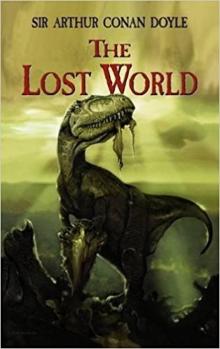 The Lost World
The Lost World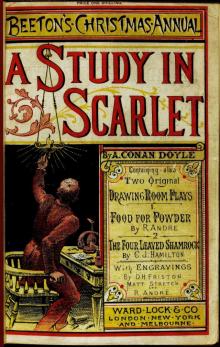 A Study in Scarlet
A Study in Scarlet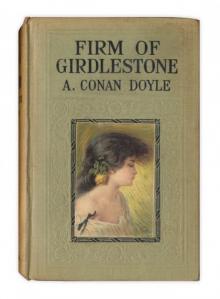 The Firm of Girdlestone
The Firm of Girdlestone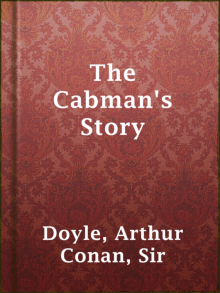 The Cabman's Story
The Cabman's Story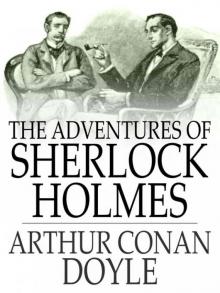 The Adventures of Sherlock Holmes
The Adventures of Sherlock Holmes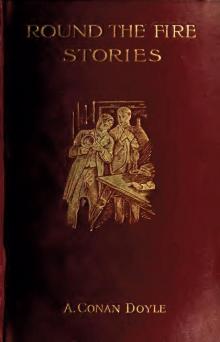 Round the Fire Stories
Round the Fire Stories His Last Bow: An Epilogue of Sherlock Holmes
His Last Bow: An Epilogue of Sherlock Holmes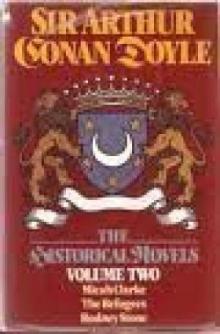 Micah Clarke
Micah Clarke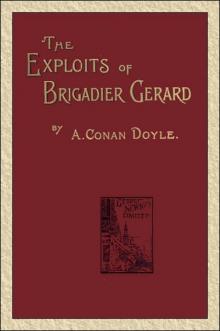 The Exploits of Brigadier Gerard
The Exploits of Brigadier Gerard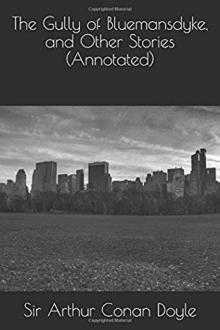 The Gully of Bluemansdyke, and Other stories
The Gully of Bluemansdyke, and Other stories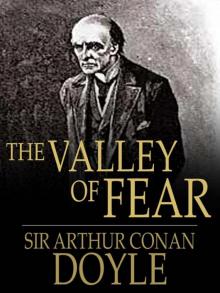 The Valley of Fear
The Valley of Fear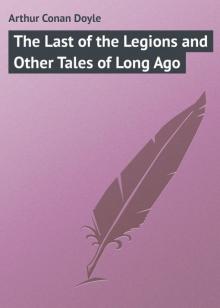 The Last of the Legions and Other Tales of Long Ago
The Last of the Legions and Other Tales of Long Ago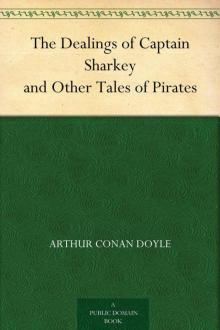 The Dealings of Captain Sharkey, and Other Tales of Pirates
The Dealings of Captain Sharkey, and Other Tales of Pirates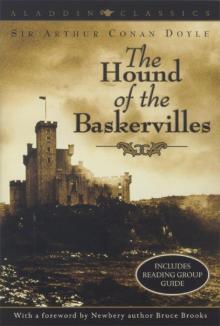 The Hound of the Baskervilles
The Hound of the Baskervilles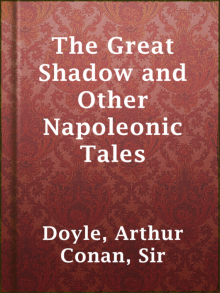 The Great Shadow and Other Napoleonic Tales
The Great Shadow and Other Napoleonic Tales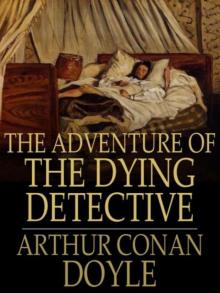 The Adventure of the Dying Detective
The Adventure of the Dying Detective The Man from Archangel, and Other Tales of Adventure
The Man from Archangel, and Other Tales of Adventure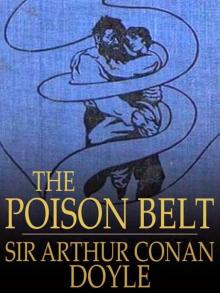 The Poison Belt
The Poison Belt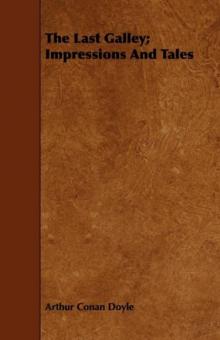 The Last Galley; Impressions and Tales
The Last Galley; Impressions and Tales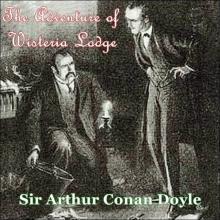 The Adventure of Wisteria Lodge
The Adventure of Wisteria Lodge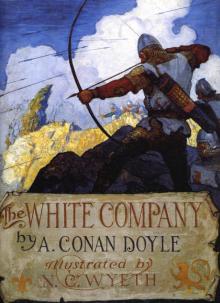 The White Company
The White Company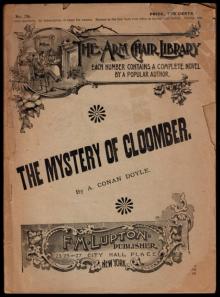 The Mystery of Cloomber
The Mystery of Cloomber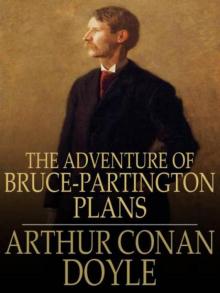 The Adventure of the Bruce-Partington Plans
The Adventure of the Bruce-Partington Plans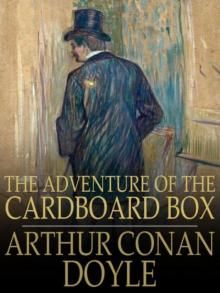 The Adventure of the Cardboard Box
The Adventure of the Cardboard Box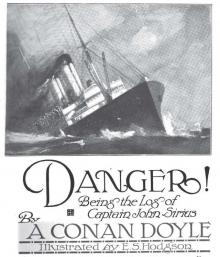 Danger! and Other Stories
Danger! and Other Stories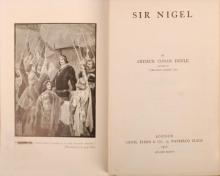 Sir Nigel
Sir Nigel The Return of Sherlock Holmes
The Return of Sherlock Holmes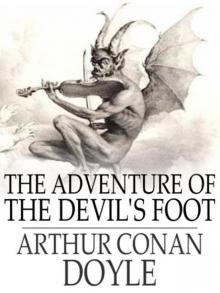 The Adventure of the Devil's Foot
The Adventure of the Devil's Foot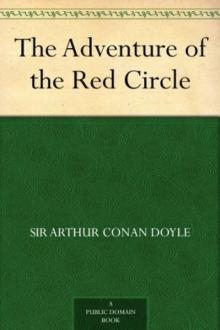 The Adventure of the Red Circle
The Adventure of the Red Circle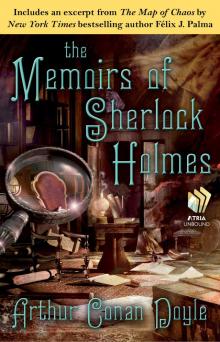 The Memoirs of Sherlock Holmes
The Memoirs of Sherlock Holmes The Adventure of the Yellow Face
The Adventure of the Yellow Face The Adventure of the Norwood Builder
The Adventure of the Norwood Builder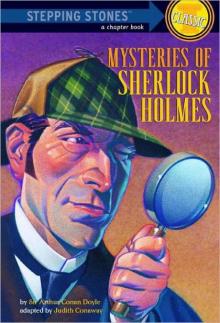 Mysteries of Sherlock Holmes
Mysteries of Sherlock Holmes The Adventure of the Missing Three-Quarter
The Adventure of the Missing Three-Quarter The Adventure of the Final Problem
The Adventure of the Final Problem A Scandal in Bohemia
A Scandal in Bohemia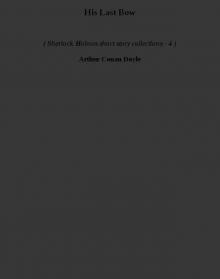 His Last Bow shssc-4
His Last Bow shssc-4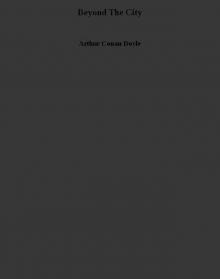 Beyond The City
Beyond The City The Adventure of the Gloria Scott
The Adventure of the Gloria Scott The Parasite
The Parasite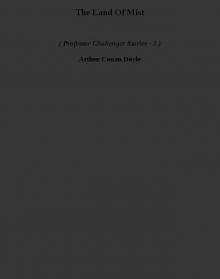 The Land Of Mist pcs-3
The Land Of Mist pcs-3 The Adventure of the Musgrave Ritual
The Adventure of the Musgrave Ritual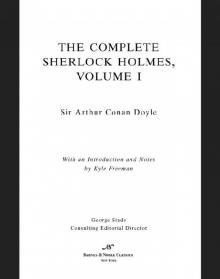 The Complete Sherlock Holmes, Volume I (Barnes & Noble Classics Series)
The Complete Sherlock Holmes, Volume I (Barnes & Noble Classics Series) The Adventure of the Stockbroker's Clerk
The Adventure of the Stockbroker's Clerk The Adventure of the Copper Beeches
The Adventure of the Copper Beeches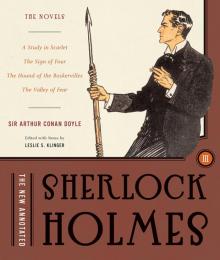 The New Annotated Sherlock Holmes
The New Annotated Sherlock Holmes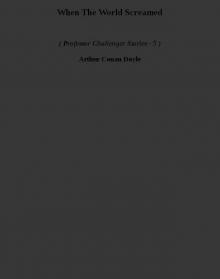 When The World Screamed pcs-5
When The World Screamed pcs-5 The Adventure of the Six Napoleons
The Adventure of the Six Napoleons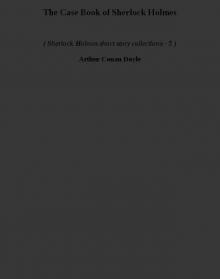 The Case Book of Sherlock Holmes shssc-5
The Case Book of Sherlock Holmes shssc-5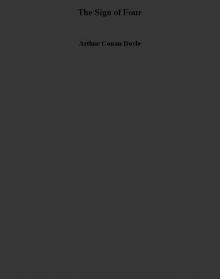 The Sign of Four
The Sign of Four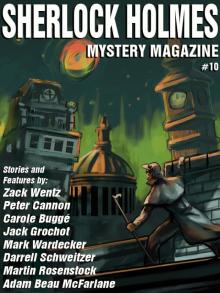 Sherlock Holmes Mystery Magazine #10
Sherlock Holmes Mystery Magazine #10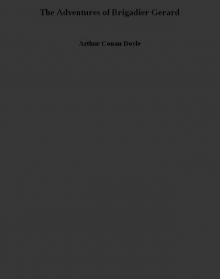 The Adventures of Brigadier Gerard
The Adventures of Brigadier Gerard The Adventure of the Second Stain
The Adventure of the Second Stain The Adventure of the Engineer's Thumb
The Adventure of the Engineer's Thumb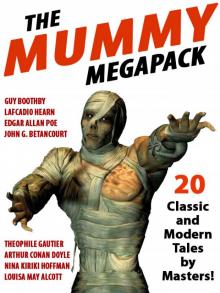 The Mummy Megapack
The Mummy Megapack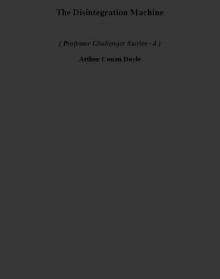 The Disintegration Machine pcs-4
The Disintegration Machine pcs-4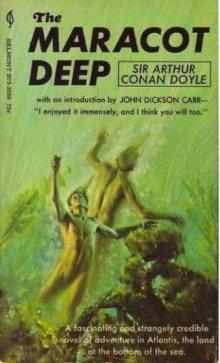 The Maracot Deep
The Maracot Deep The Five Orange Pips
The Five Orange Pips The Adventure of the Crooked Man
The Adventure of the Crooked Man The Adventure of the Blue Carbuncle
The Adventure of the Blue Carbuncle The Adventure of Silver Blaze
The Adventure of Silver Blaze The Adventure of the Solitary Cyclist
The Adventure of the Solitary Cyclist The Adventure of the Naval Treaty
The Adventure of the Naval Treaty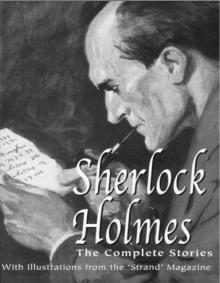 Sherlock Holmes. The Complete Stories
Sherlock Holmes. The Complete Stories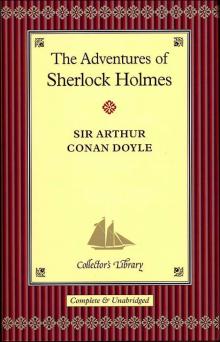 The Adventures of Sherlock Holmes (sherlock holmes)
The Adventures of Sherlock Holmes (sherlock holmes) The Adventure of the Empty House
The Adventure of the Empty House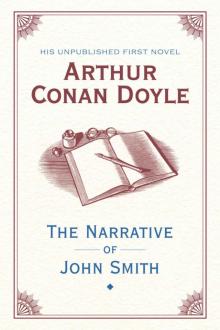 The Narrative of John Smith
The Narrative of John Smith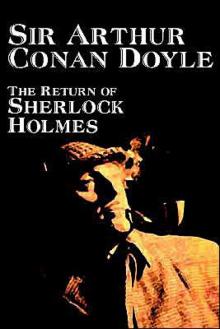 The Return of Sherlock Holmes (sherlock holmes)
The Return of Sherlock Holmes (sherlock holmes) The New Revelation
The New Revelation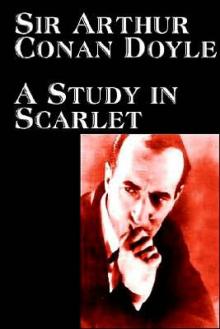 A Study in Scarlet (sherlock holmes)
A Study in Scarlet (sherlock holmes) The Vital Message
The Vital Message Sherlock Holmes Complete Collection
Sherlock Holmes Complete Collection Round the Red Lamp
Round the Red Lamp The Boscombe Valley Mystery
The Boscombe Valley Mystery The Adventure of the Beryl Coronet
The Adventure of the Beryl Coronet The Refugees
The Refugees The Adventure of the Three Students.
The Adventure of the Three Students.